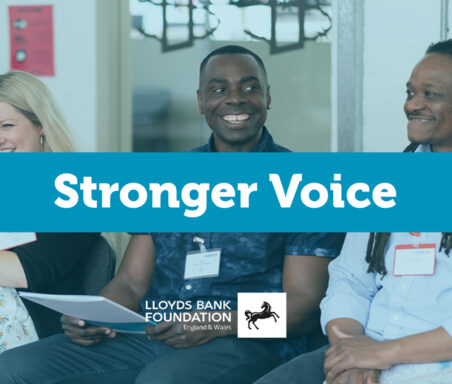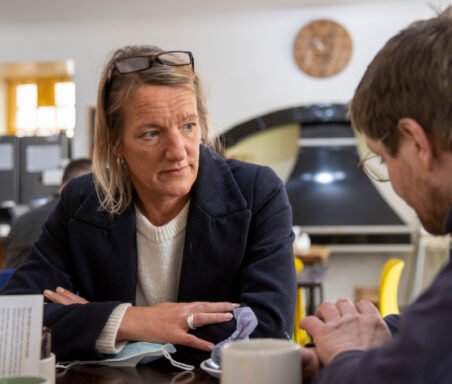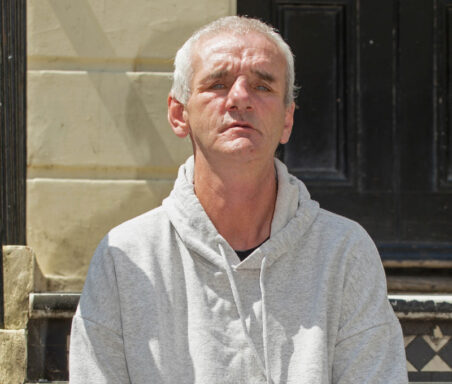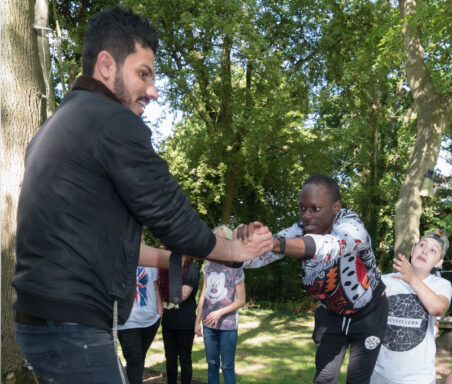Clinks Thinks sets out our key principles, ambitions and recommendations, developed in consultation with voluntary sector organisations.
Principles
Recognise the role of the voluntary sector in supporting people in the criminal justice system to realise their potential
A modern and effective criminal justice system will recognise the voluntary sector as a key partner and fund it sustainably.
The voluntary sector is made up of charities, community groups and social enterprises providing a range of services that respond to the diverse needs of people in contact with the criminal justice system. These include services in accommodation, education, training and employment, and personal wellbeing, as well as providing finance, benefit and debt advice, and dependency and recovery services. It includes organisations that specialise in meeting the needs of particular groups of people such as women, racially minoritised people, or young adults and those that focus on prevention. Alongside these vital interventions, the voluntary sector also undertakes advocacy and research work.
-
Clinks Thinks the voice of the voluntary sector needs to be sought out and heard in campaigning, policy and service delivery – without fear of repercussions.
Throughout its history the voluntary sector has used its knowledge and expertise as a driver for positive change. It has long provided some of the most effective services, support and advocacy to divert people away from the criminal justice system to help them transform their lives and used the evidence from this work to change systems for the better.
The knowledge, experience and expertise held by organisations means they are crucial partners in the design and delivery of criminal justice policy and practice and their voices must be valued and strengthened.
-
recognise the voluntary sector as a vital partner in delivering a fair and effective criminal justice system. It should draw on voluntary sector expertise when developing policy and services. It should commit resources to improving its partnerships with the voluntary sector, including national engagement mechanisms and the recruitment of voluntary sector coordinators in every prison.
-
use their knowledge and evidence from service delivery to influence decision makers to make systemic change. They should communicate their impact on the ability of people in the criminal justice system and their families to realise their potential.
-
-
Clinks Thinks grant funding and full cost recovery on contracts are essential to ensure the voluntary sector supporting people in the criminal justice system can continue to be successful.
Complex contracting processes can be challenging to navigate for smaller organisations and many organisations do not receive full cost recovery on contracts, forcing them to subsidise the shortfalls using other charitable resources. Over the years there has been a shift towards government funding being provided through large contracts. Alongside this some charitable trusts and foundations have ceased to grant fund criminal justice organisations due to confusion over what services statutory resources are funding and what additional impact charitable funds are able to make. This presents a challenge to criminal justice organisations which, compared to the wider voluntary sector, are disproportionately small, local and specialist organisations who are dependent upon grant funding.
Grant funding is the most effective way to fund the voluntary sector. Grants are cost effective, simpler, more flexible and faster to implement than other forms of commissioning. They avoid bureaucracy, which benefits commissioners, delivery organisations and service users because they can respond to changing needs.
-
ensure the voluntary sector is adequately resourced to work as it’s partner to deliver high-quality services through the provision of flexible, unrestricted, multi-year grant funding. Contracts should provide full cost recovery. It should be clear about what statutory resources are funding so charitable trusts understand the space in which they can work with the voluntary sector.
-
be clear with funders about the cost of delivering high quality services and not shy away from bidding/applying for full cost recovery and work alongside other voluntary organisations to influence for an improved system to maximise the impact of their resources.
-
Ensure criminal justice services have strong foundations
The criminal justice system and related services are often siloed and have rarely been designed with input from those who use them. As a result, many people do not get the support they need or fall through the gaps between services and so are not given a fair chance to reach their potential.
-
Clinks thinks all services should be person-centred – involving the person using the service as an equal partner in planning and focusing on their individual needs. They are effective and help people thrive.
Desistance from crime is a process: people will make progress and experience setbacks along the way with many factors impacting their journey including employment, housing, health and wellbeing, family relations, a positive self-identity, and forming social networks with peers, support workers, friends and communities.
Person-centred services recognise this and provide flexible support, tailored to the individual, and often delivered at the local level by highly trained staff and volunteers. The voluntary sector is a driving force for their expansion and have built networks that specialise on working with particular needs. This approach works. It helps to support the person on the journey to succeed while reducing crime and making communities safer.
-
put people at the heart of policy and practice design. Services should be person-centred, acknowledging that people may need long-term support, and that relapse can sometimes be part of the journey to rehabilitation.
-
work towards a person-centred model and share the successes and challenges of person-centred programmes, promoting their impact.
-
-
Clinks thinks joined up services give individuals the best chance of accessing the help they need to desist from crime and realise their potential.
People in the criminal justice system often experience overlapping problems such as homelessness, unemployment, problems with drugs and/or alcohol, and mental ill-health. A lack of coordination between services and commissioners means people are often passed between a maze of services, each dealing with a single issue. This wastes resources without getting people the support they need to realise their potential.
The voluntary sector has shown that you can support people to navigate the maze by delivering integrated services. It shows us what effective joined up working looks like through person-centred approaches and strong referral partnerships.
-
collaborate with voluntary sector organisations and service users to ensure fully integrated services, designed to support people with multiple needs, are resourced to help people succeed.
-
build strong referral pathways to point people towards connected services, and build internal knowledge of approaches in different sectors. Wherever possible voluntary organisations should collaborate on service design.
-
-
Clinks thinks the voices and expertise of people with lived experience must be amplified and integrated throughout the criminal justice system.
The perspectives of people and families with first-hand experience of the criminal justice system are vital if we want to improve policy, services and outcomes. To improve the system, we must understand it from all angles, and people with lived experience provide insights no one else has. Those insights can be harnessed to improve the quality and impact of services and achieve better outcomes, including reducing reoffending. We must ensure their knowledge is both heard and integrated. The ways to do this range from simply listening to them, through to ensuring people with lived experience lead services and voluntary organisations.
The vital contribution of people with lived experience is increasingly recognised by the voluntary and statutory sectors. Co-produced policy, programmes and service delivery ensure that people receive the most effective and efficient support. Hiring people with lived experience also provides opportunities for individuals to realise their potential. The criminal justice system should be a role model through inclusive employment and show that it makes sense to hire this workforce.
-
embed the involvement of people with lived experience throughout the criminal justice system to inform policy and practice. This means harnessing their insight from design to delivery, hiring people, enabling their progression within the workforce, supporting their ability to volunteer, and ensuring criminal records policy is not an unnecessary barrier.
-
implement inclusive hiring practices, set targets for employing staff and volunteers with lived experience, and measure their progress. They should listen to people with lived experience from design to delivery, share good practice, and support staff with lived experience to realise their potential.
-
Understand and meet the needs of people in the criminal justice system and their families and other significant relationships
An effective criminal justice system must clearly understand and meet the needs of the people in contact with it – including families. This includes considering what drove them into the system in the first place so that it can effectively support them to move away from crime towards a positive life.
We do not all start life on an equal footing and the same interventions will not work for us all. Different groups of people have different experiences of the criminal justice system and different outcomes as a result – whether they are racially minoritised, children, young adults, experience mental or physical ill-health, are women, or a combination of these. The voluntary sector has pioneered approaches to support people, identifying the most positive pathways by using the right approaches for the individual, according to their needs.
-
Clinks thinks that the prison population can and must be reduced to make communities safer. Too many people are imprisoned where alternatives for them would be more effective.
Evidence consistently shows that the best way to make communities safer and prevent crime is to support people through effective pathways to better outcomes. Prisons are overcrowded and understaffed to breaking point. This means that people in prison cannot access the services they need to move on in their life even after they are released.
The sensible approach is to divert some resources to proven effective community alternatives, rather than increasing prison numbers. Reducing the prison population is the most realistic long-term solution to making sure prisons run effectively for people who live and work there.
Voluntary services support rehabilitation in the community by providing support like mental health services, drug and alcohol support, quality housing, and support in getting people a job. In recent years there has been a focus on increasing the number of services that are tailored for certain groups, particularly women and children. Their success should be replicated across all people in the criminal justice system and factored into sentencing.
-
develop and implement a clear strategy for reducing the number of people in prison through investment in prevention and diversion and expanding the use of community alternatives that are proven to be more effective at reducing crime. It must halt sentence inflation and reduce the amount of time people are trapped in prison on remand.
-
highlight their evidence on successful community interventions that prevent the flow of people into the criminal justice system and reduce reoffending. They should work in partnership with other voluntary organisations to keep innovating new solutions and shift focus to what works.
-
-
Clinks thinks all organisations working in criminal justice must acknowledge and work to tackle structural, as well as individual, racism and ensure that their services meet the needs of racially minoritised people.
Becoming anti-racist is essential to building a justice system which is fair and equitable so that our communities can become safer and stronger. People from some racially minoritised groups are overrepresented in the criminal justice system and experience poorer outcomes compared to people who are not racially minoritised, which impact their lives and communities.
Organisations led by and focused on racially minoritised people provide tailored services to people from racially minoritised communities, based on their needs and experiences. Their vital contribution is increasingly recognised by the voluntary and statutory sectors. An increasing number of people from racially minoritised groups who have lived experience of the criminal justice system are moving into leadership roles within the voluntary sector, though this must go much further.
-
ensure anti-racism is prioritised in all policy and practice, and is embedded throughout the criminal justice system. All criminal justice policy proposals and service developments should consider the impact on racial disparities and seek to eradicate them. Government should expand and improve data collection where necessary to identify and prevent biases.
-
strive for leadership that reflects, and services that meet the needs of, racially minoritised people in the criminal justice system, recognising that tackling racism in the criminal justice system is a key part of improving the system for everyone. Organisations should work in partnership with and speak out about racial inequality in coalition with organisations led by and focused on racially minoritised people.
-
-
Clinks thinks prison should be a last resort for children. To ensure that we achieve this, we must increase the use of early intervention and diversion.
The imprisonment of children (people under 18 years old) represents a failure of services upstream. Instead, the focus should be on ensuring they can reach their potential by diverting them away from the criminal justice system. If this fails, we should prioritise sensible alternatives to prison. Furthermore, we must tackle the over-representation of racially minoritised children in the system, which has increased as overall numbers have reduced.
In recent years, the numbers of children in prison have dramatically reduced, demonstrating that alternatives to prison are successful at reducing reoffending. The youth justice system needs ongoing investment to prevent children from being sent to prison. This is essential to keep caseloads small and provide flexible one-to-one specialist support. It must also ensure that the welfare and safety is the foremost consideration for any children held in prison.
-
ensure the youth justice system focuses on early intervention, diversion and alternatives to prison and work in partnership with voluntary sector organisations to support young people to move away from crime. It should also develop a national strategy to address the overrepresentation of racially minoritised children in custody and address the reasons why alternatives have failed this group.
-
develop prevention and diversion services and seek to form local and national partnerships with statutory services and policy makers to ensure these services are embedded. to prevention. They should recognise the significant racial inequality in the youth justice system, design anti-racist services and advocate for anti-racism
-
-
Clinks thinks young adults need a criminal justice system that considers their distinct needs at every stage.
Young adults (aged 18-25) need tailored approaches that consider their distinct needs. The brain continues to develop into adulthood and does not reach full maturity until at least the mid-twenties which means that young adults are more likely to demonstrate risk-taking and emotionally driven behaviour. Neurodivergence and trauma should also be considered as these can hinder the development of maturity and impact on behaviour.
In young adulthood, behaviour change is also more readily possible, so it is a particularly good time to promote learning, personal growth and the development of pro-social identity. On the other hand, at this stage of development, young people can quickly become disillusioned and disengaged from professionals if support is not forthcoming, appropriate, or timely.
Tailored and developmentally appropriate approaches to young adults are needed at every stage of the criminal justice system, along with practical and emotional support to help them navigate their path into adulthood. Criminal justice services should look to create a shift in the way that a young person sees themselves, from an identity that promotes offending to one that promotes a positive contribution to society.
-
implement a resourced strategy to ensure the effective engagement of young adults at all stages of the criminal justice system which also recognises the importance of education, housing, and employment to successful transitions to adulthood and desistance from crime.
-
provide age-appropriate support that supports individual needs, promotes the identity shift, and advocate for services that recognise young adults as a distinct group.
-
-
Clinks thinks people in the criminal justice system must have equity of health and social care with the wider population and their health inequalities should be recognised.
Voluntary sector organisations are key to providing effective health and social care for people in the criminal justice system, who experience significant health inequalities. These are clear both in terms of their individual health and wellbeing and as a result of imprisonment.
As well as delivering frontline health services, voluntary organisations support people to access and engage with health providers, provide holistic support, accompany people to appointments, and assist them to understand and manage their health needs.
Statutory health and social care services must meet the needs of people in contact with the criminal justice system, including those in prison, to reduce health inequalities and improve outcomes. This should include investment in prevention, early identification of physical and mental health needs, learning from people using services, training for sentencers on community drug, alcohol and mental health treatment options and continuity of care for people as they enter prison, move between different prisons or back into the community.
-
ensure that the commitment that ‘Prisoners get the same healthcare and treatment as anyone outside of prison’ becomes a reality. That means commissioners and providers in the health and criminal justice systems must work together to prioritise improving health and wellbeing and continuity of care.
-
use evidence about health and wellbeing needs to inform their service design and influencing work and ensure joined up working to signpost people to health services.
-
-
Clinks thinks gender-specific, trauma-informed services to divert women away from prison and the criminal justice system must be prioritised.
Evidence shows that women-centred services,delivered in the community, work to reduce crime and help people realise their potential. The voluntary sector provides a variety of specific services for women, including the one-stop-shop approach that delivers a woman-centred, holistic package of support in a safe and women only environment.
Women in the criminal justice system are likely to have experienced sexual and domestic abuse, mental ill-health, and chronic substance misuse problems. Poverty is also a core driver in crime and in many cases abuse, exploitation or coercion women have faced is a cause of offending itself. Some women, for example women with care experience and racially minoritised women, are overrepresented in the system.
Only a tiny proportion of women who have offended are assessed as a high risk of harm to others and as such most women could be effectively managed in the community, thereby avoiding the need for prison. It also ensures families can stay together; an unknown number, upwards of 17,000 children each year are separated from their mother by imprisonment.
-
ensure the implementation of the Female Offender Strategy and Women’s Blueprint in Wales and work cross-departmentally to ensure sustainable funding for specialist women’s services to respond holistically to the needs of women in contact with the criminal justice system.
-
consider how they can offer gender-specific services and interventions, and partner with women’s specialist services to signpost to the right support. They should continue to speak up for the women they support.
-
-
Clinks thinks it is vital that services to support people with a loved one in prison, and to enable people in prison to maintain their relationships with family and other significant relationships, are consistent and properly funded.
Positive and consistent social relationships play a key role in supporting wellbeing and reducing the likelihood of reoffending so that people in contact with the criminal justice system and their families can lead positive lives. These services are vital and effective. They reduce self-harm and violence, reinforce positive identities, provide motivation to stop committing crime and support integration into the community.
Families and other significant relationships are often the main source of emotional, practical, and financial support for people in contact with the criminal justice system. The impact of the imprisonment of a loved one can be far reaching – on mental health, finances, and other areas of life – and children and families need support through this.
The voluntary sector has played a leading role in designing and delivering services to support social relationships. This means not just building or sustaining the relationships between people who have committed a crime and their family and other significant relationships, but also providing services for people affected by the imprisonment of a loved one.
-
fund and expand services that both support people in prison and family and the other significant relationships of people in the system. A key focus must be on supporting the needs and wellbeing of children and families affected by parental imprisonment.
-
continue to deliver support to people with a loved one in prison, and to enable people in prison to maintain their relationships with family and other significant relationships. They should share evidence of their effectiveness and continue to speak up for the adults and children they support.
-
-
Clinks thinks the arts and creative industries have the power to engage, inspire and support people to transform their lives. People in contact with the criminal justice system and their families should have opportunities to express creativity through meaningful access to arts activities.
The arts in criminal justice have a long and established history of transforming lives and challenging stereotypes. Engaging in creative activity, including music, theatre, writing and the visual arts can help reduce crime and empower people in the criminal justice system to realise their potential. Access to the arts can be a springboard to positive change, improving self-esteem and confidence and supporting a person’s journey away from crime and towards a new identity.
The voluntary sector offers arts services ranging from preventative work with children through to programmes inside prisons and on release. These not only provide a focused activity but can improve wellbeing and provide mental health support to individuals.
The creative arts contribute to social change and connecting people in the criminal justice system with the arts creates connections, recognises our shared humanity, and inspires the imagining and creation of new solutions to social problems and work towards a more just world.
-
work with Arts Council England the Arts Council of Wales to co-produce a joint strategy to support the arts within criminal justice settings and ensure that creative work is embedded in regional prison, probation, and rehabilitation strategies.
-
consider the inclusion of arts into programming and discuss these options with people with lived experience at the design phase. They should build partnerships with specialist arts organisations as well as building connections with the wider arts sector to develop routes out of the criminal justice system.
-
Learn more
Planning your own influencing strategy with Stronger Voice
Stronger Voice was a three-year project, funded by Lloyds Bank Foundation for England & Wales, that strengthened the voice and influence of the voluntary sector working in criminal justice through a programme of information, collaboration, training and capacity building. As part of Stronger Voice, Clinks ran a series of expert sessions looking at different influencing strategies that organisations have used to change criminal justice policy. You can access these sessions here.
We know that people learn differently and will have different pressures on your time and resources. We have therefore made available both the recordings from each session alongside a written case study.
Alongside the Stronger Voice resources, we have included other free resources that organisations may find useful in their influencing work. We will continue to add these as they are released.
-
 YouTube Stronger Voice: Expert Seminars
YouTube Stronger Voice: Expert Seminars -
 pdf Stronger Voice: Campaigning in the face of hostility
pdf Stronger Voice: Campaigning in the face of hostility -
 pdf Stronger Voice: Using frontline expertise to influence policy
pdf Stronger Voice: Using frontline expertise to influence policy -
 pdf Stronger Voice: Working with officials to influence policy
pdf Stronger Voice: Working with officials to influence policy -
 pdf Stronger Voice: Influencing local authorities on accomodation
pdf Stronger Voice: Influencing local authorities on accomodation -
 pdf Stronger Voice: Anti-racism in action
pdf Stronger Voice: Anti-racism in action
